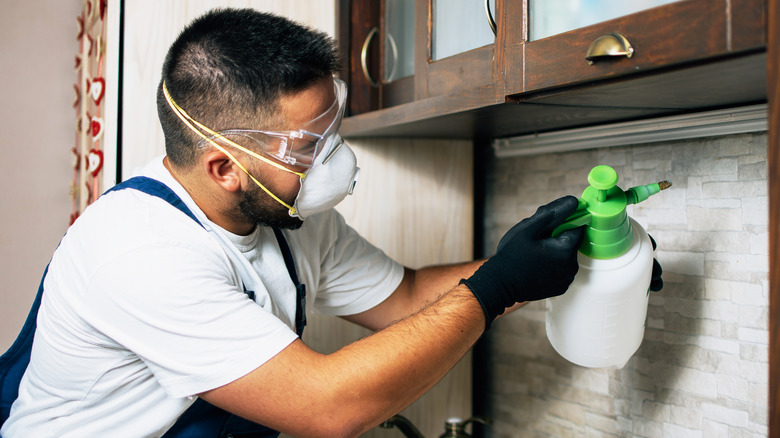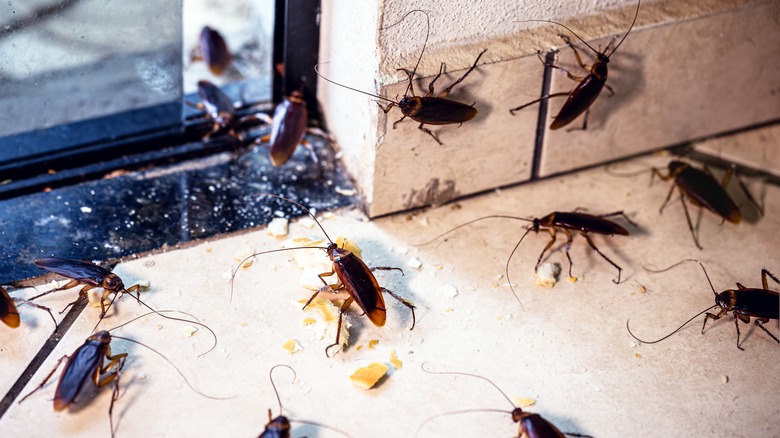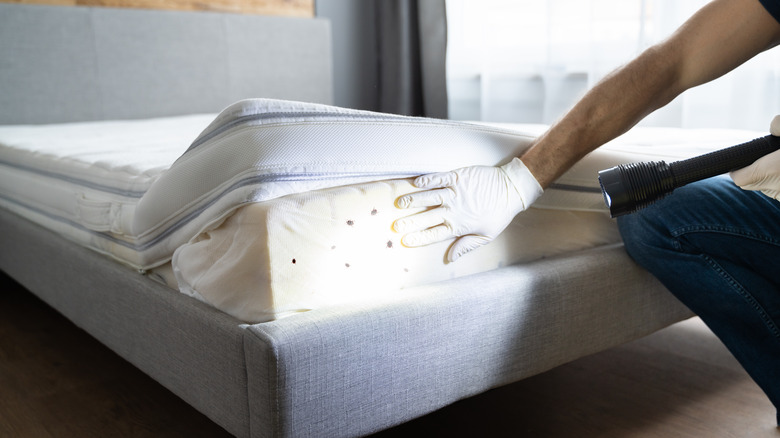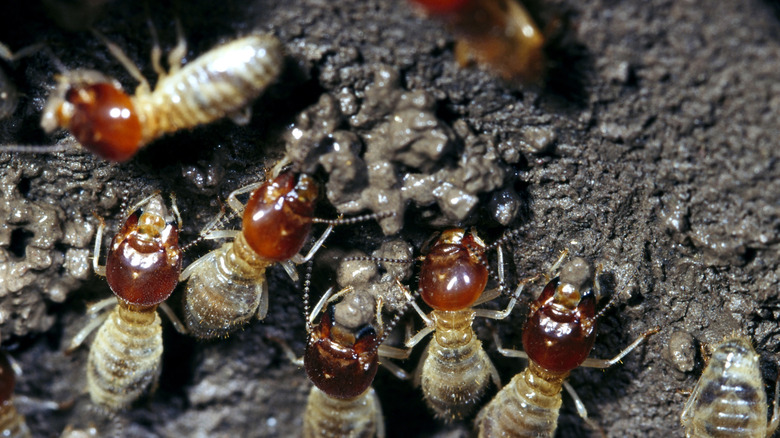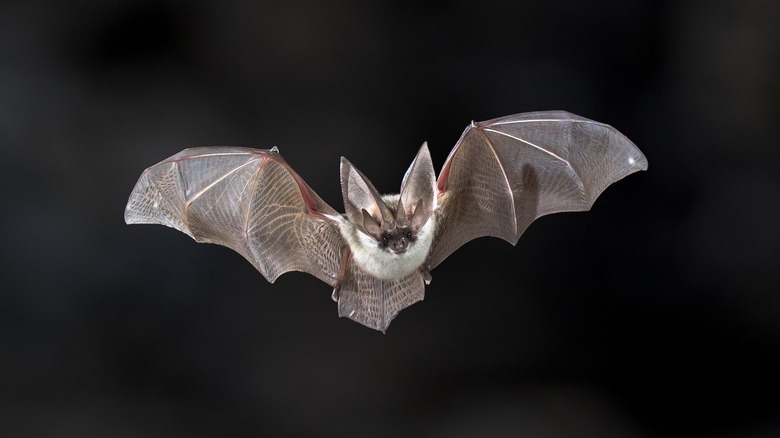Common Pests You're Better Off Letting The Pros Exterminate For You
There are plenty of times when you can defer to DIY measures for pest control. You can use certain hacks to keep insects out of your house, usually without the use of harsh, toxic chemicals. Unfortunately, there are some instances when you need to call in a professional pest removal company. Although certain scents can repel even these serious pests, the critters in question often spread harmful diseases and can multiply in rapid succession.
Although one pest doesn't always mean you have an infestation, it can point to a larger issue. For example, bat ticks — a soft tick parasite — aren't known transmitters of Lyme disease. They do, however, signify a bat roost nearby, which can point to a larger, more dangerous issue if left unchecked. This is especially true if bats are roosting in your attic. The same goes for termites — an infestation could eviscerate a home's structure in as little as five years, making them a threat that requires prompt attention. For this reason, there are certain times when you need to defer to the pros, as not all pests are created equal.
Roaches
If you see one roach, it could be an isolated incident. However, cockroaches usually live in groups, which means more of them could be hiding. They could be behind your refrigerator, in your sinks, or under your stove. These bugs look for dark places to nest, so most of your home is fair game. They could even be hiding in your pantry, or worse, in your food. Since roaches are known transmitters of streptococcus, salmonella, and staphylococcus, you don't want them lurking about. They crawl on countertops and any exposed food — pet food included — can easily be the site of future foodborne illnesses.
Roaches multiply swiftly and efficiently. One female roach can produce upwards of 300 offspring in a single year, making them one pest you don't want in your home. Yes, you can take precautionary DIY measures to deter roaches from entering your house, but once you have an infestation, all bets are off. These pests become accustomed to various DIY repellents, which means your efforts won't work against large populations of these bugs. Aside from foodborne illnesses, roaches can damage your home, including furniture and appliances. As they shed their skin, you may notice discolored fabric on anything upholstered. Their feces also cause discoloration, making them a nuisance to multiple areas of your home. Should you see roaches in your space, it's best to have professionals inspect for signs of a larger infestation.
Bed Bugs
Fortunately, bed bugs don't transmit any known diseases. This doesn't mean you'll want to welcome them into your home, mind you. Bed bugs need to eat blood to survive, which means they're feasting on you when you sleep. You might find itchy bumps all over your body, and anyone with an allergy might experience a more serious reaction to these pests. The issue with DIY treatment for bed bugs is that they can hide deep within mattresses, couches, and inside walls. This means that even the best DIY treatment can't reach an infestation. Yes, you can cover your mattress with special mattress protectors, designed to encase it on all six sides. But if you already have a bed bug infestation, adding a cover won't do much, especially if these pests are inside your walls.
It only takes a few weeks for a bed bug population to grow, which means an infestation can occur quickly. If you suspect you have an infestation, you should consider calling in professionals. A pest removal company can use various heat treatments if you have bed bugs in or on your mattresses, sheets, toys, clothing, or other fabrics, taking measures to avoid chemical pesticides when possible. They may need to spray targeted foam pesticides into cracks and crevices around your home, however, targeting infestations. Keep in mind that these products are poisonous and should only be handled by a professional.
Termites
Although you can use salt to deter termites from your home naturally, it won't work if you have an active infestation. Since termites are known to hide inside walls and floors, salt can't affect them unless they come into direct contact with it. As such, a termite population can continue to grow, just out of reach. And seeing as large termite colonies can consume a pound of wood daily, your home could suffer the consequences of these pests running rampant.
Termites are known for destroying homes and causing significant property damage. Although moderate amounts of termite damage can cause upwards of $3,000, larger-scale infestations can significantly affect your home. To make matters worse, termite damage isn't usually covered by homeowner's insurance since it's considered a type of preventative pest control. If you're unsure whether you have a termite infestation, you can hire a professional pest removal company to conduct an inspection. If they find evidence of termites, these professionals can swiftly and efficiently counteract an infestation.
Bats
Bats are among the nocturnal creatures you don't want to tango with on your own. A known carrier of rabies, bats must be handled with professional care. Although it's suspected that a low percentage of bats carry rabies, the threat is still real. Aside from rabies, bats also transmit histoplasmosis. One bat might not be too much for a pest control professional to tackle, but numerous bat sightings could mean you have an infestation on your hands. To further complicate things, bats are a legally protected critter, which makes removing them that much trickier. It's even illegal to kill bats, which is why you need a professional to safely — and humanely — remove them from your home.
Wildlife removal specialists often use one-way exclusion doors to remove these pests from your property. These special doors allow pests to exit your home. Once out, they can't reenter. The one caveat is that most states have bat exclusion dates, meaning that you can only remove bats from your property during certain times of the year. These dates usually coincide with the times when females are caring for their pups, ensuring the animals are protected. Since exclusion dates vary from state to state, it's best to work with professionals when you have bats in the house. Additionally, bat feces, known as guano, contains harmful pathogens. This means you might want a professional to clean up afterward, as they know how to do so safely and effectively.
